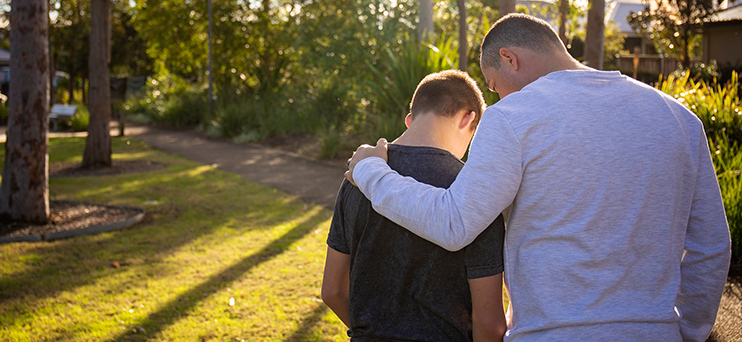Drought, bushfire, flood or other emergencies can be overwhelming for children and young people. Such events turn the predictability of a child’s world upside down and challenge their sense of security. They can make them fear for their own, their carers’ and their pets’ lives.
Children will respond differently to an emergency and may not react in the way you expect. Their response will depend on their age, stage of development, personality and past experiences. The better you prepare and support the children in your care, both physically and psychologically, the easier it will be for the whole family to recover.
For young children, the best support is generally physical comfort and the opportunity to rest, play or draw. For older children, talking to them and encouraging them to verbalise their feelings will help them feel less helpless or isolated in their emotions.
In this article, we highlight some tips to help you support your child after being in, or witnessing a natural disaster.
1. Involve children in emergency planning.
Children who feel helpless tend to experience more severe stress symptoms. To support your child, include them in discussions before an emergency to help them understand what they need to do to stay safe if the emergency eventuates. By giving children a greater sense of control and security, you will help them cope better in the emergency.
2. Talk openly and honestly about the possible impact of the emergency.
Choose a time when you won’t be rushed or interrupted and prepare your child for what it might be like in an emergency. This includes practical things like loss of electricity, water and telephone services, and roads being cut off.
3. Teach children how to manage strong emotions.
Reassure children that strong feelings are normal reactions to an unusual event. Teach them practical ways to manage these strong feelings, such as replacing frightening thoughts with calm ones. Australian Red Cross have developed wonderful resources including the PDF: Talking with children before an emergency. Remind children that there are also many people who can help in an emergency such as extended family, neighbours and friends, and emergency workers.
4. Don’t forget to take care of yourself.
How the emergency impacts on you, and how you respond to the feelings and behaviour of children in your care, will have an enormous impact on their ability to cope and recover. You need to be physically and emotionally present so that you can comfort and support the children in your care. If you are distressed and having difficulty with your own feelings, it’s important to seek support and help for yourself. If you don’t, the child’s fear and distress will increase.
5. Talk about the event.
Although you may be tempted to shield children by not talking about the emergency, this is likely to make them more anxious. It helps to bring all the issues out in the open as a family so that everyone, including children, feel supported and heard. When explaining an emergency event to children, provide accurate information without going into frightening details. Without accurate, age-appropriate information, children are likely to imagine a worse scenario based on their experience, available information and their imagination.
6. Watch for signs of trauma.
Never underestimate the potential mental impact of natural disasters. Always listen to children’s concerns and feelings. Take what they say seriously and make sure they haven’t jumped to any wrong conclusions. For example, younger children may think they are somehow to blame because they thought bad things about someone. Be vigilant for signs of trauma, which could include withdrawal or regressive behaviours, clinginess, sleep problems (including nightmares) as well as physical symptoms such as headaches or stomach aches.
Extended emergencies like our current bushfire crisis can be particularly challenging – don’t forget to allow time for fun, laughter, and sharing of good times. Physical activity can also help burn off stress chemicals and improve sleep. After the chaos of an emergency, returning as much as possible to familiar routines, and giving children a greater sense of control over their lives will also help them feel less anxious.
If you are concerned about a child in your care, or feel that you are not coping yourself, contact your GP and Challenge case worker today.


